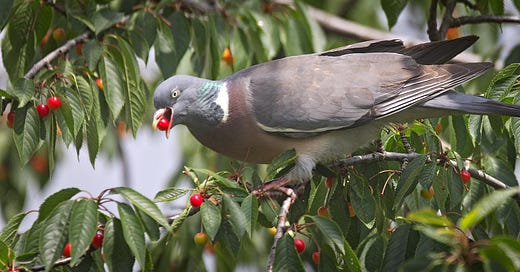"Picking cherries" by hedera.baltica is licensed under CC BY-SA 2.0
What does wielding a blunt axe mean in practice? Human beings are storytelling animals. It is easy to imagine generation after generation of our ancestors sitting around the campfire at night and listening in silence to talented storytellers. Even today, big, sweeping narratives that connect with our emotions are one of the best ways of getting our attention.
Sadly, gurus and con artists have realized the power of storytelling to a much greater extent than the people who run the news media. They will often spread hedgehog-like narratives, which mainline basic emotions like greed and fear. The narratives might tell you that everything natural is good, while anything made in a laboratory is bad, for example. It might be an ideology; or an observation about what has gone wrong with the world. Sometimes one of these stories will resonate deeply with you. You want it to be true so badly that you fall in love with the idea.
Our axes are naturally blunt. Someone who hasn’t spent any time sharpening his or her axe will be very tempted to engage in cherry picking after falling in love with a narrative. Cherry picking means looking for evidence that the story is true without worrying about the quality of the source material. In the “natural good, artificial bad” example, the next step might be to actively look for examples of plants that allegedly cure disease or medicines that are allegedly dangerous.
If we then stumble on an exception to a big, sweeping narrative that we find attractive, we can expect to experience cognitive dissonance. As regular readers will remember, this is an uncomfortable feeling that we all experience when faced with contradiction. Our instinct will be to double down on the initial narrative. It will be tempting to invent a conspiracy theory to act as a bodyguard to a great story. So, someone who thinks natural products are better than artificial ones might be tempted to develop a theory that Big Pharma wants to stop the general public from consuming certain plants that allegedly cure disease.
Once you start to put together a team of bodyguards to protect your core beliefs, it becomes very easy to develop a conspiratorial mindset. Social media can help someone who is on this path find like-minded people. Groupthink is often the result. Anti-globalists are ready and waiting for people who are self-radicalizing. Going too deep into a conspiratorial rabbit-hole can then lead to seriously bad results.
One of the first steps for those of us who want to spend some time sharpening our axes is to recognize the power of stories. Of course, a good narrative will hit us between the eyes! What we need to do next isn’t easy for us, but when a narrative provokes a strong reaction in us, we need to try and suspend judgement. Is the story reality-based or not? For example, if someone tries to tell us that anything natural is good and anything artificial is bad, can we think of any exceptions? It only takes a little reflection to realize that tarantulas are natural, while comfortable beds are artificial. That probably means that while the narrative contains a grain of truth, it is an over-simplification of a complex reality.
Once we get used to looking for exceptions, it becomes easier to think like a Bayesian by ascribing percentages to our beliefs and moving them up and down based on the evidence. We can then think about the credibility of our source material, rather than rushing straight for the cherries. A few modest bets can help us work out which ideas have predictive value and which don’t. See you next week!
Sharpen Your Axe is a project to develop a community who want to think critically about the media, conspiracy theories and current affairs without getting conned by gurus selling fringe views. Please subscribe to get this content in your inbox every week. Shares on social media are appreciated! If this is the first post you have seen, I recommend starting with the critical-thinking rabbit hole, which includes links to a free book.
[Updated on 10 March 2022] Opinions expressed on Substack and Twitter are those of Rupert Cocke as an individual and do not reflect the opinions or views of the organization where he works or its subsidiaries.



